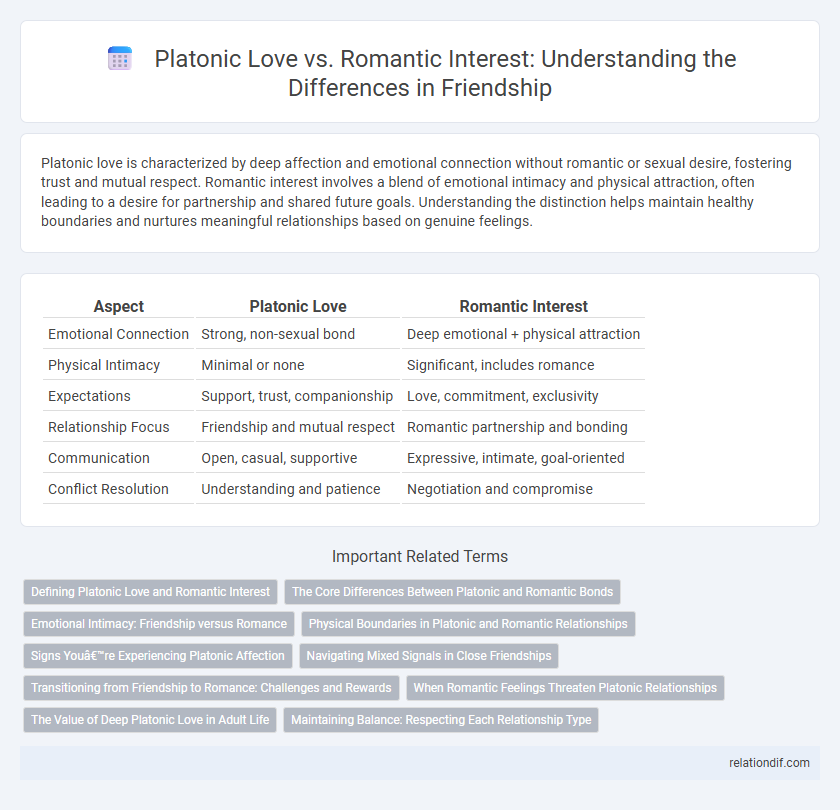Platonic love is characterized by deep affection and emotional connection without romantic or sexual desire, fostering trust and mutual respect. Romantic interest involves a blend of emotional intimacy and physical attraction, often leading to a desire for partnership and shared future goals. Understanding the distinction helps maintain healthy boundaries and nurtures meaningful relationships based on genuine feelings.
Table of Comparison
| Aspect | Platonic Love | Romantic Interest |
|---|---|---|
| Emotional Connection | Strong, non-sexual bond | Deep emotional + physical attraction |
| Physical Intimacy | Minimal or none | Significant, includes romance |
| Expectations | Support, trust, companionship | Love, commitment, exclusivity |
| Relationship Focus | Friendship and mutual respect | Romantic partnership and bonding |
| Communication | Open, casual, supportive | Expressive, intimate, goal-oriented |
| Conflict Resolution | Understanding and patience | Negotiation and compromise |
Defining Platonic Love and Romantic Interest
Platonic love is characterized by deep affection and emotional connection without sexual desire, emphasizing mutual respect, trust, and shared values. Romantic interest involves a combination of emotional intimacy and physical attraction, often accompanied by desires for a committed partnership. Understanding the distinctions between these forms of love helps clarify relationship boundaries and expectations.
The Core Differences Between Platonic and Romantic Bonds
Platonic love centers on deep emotional connection and trust without sexual attraction, emphasizing companionship and mutual support. Romantic interest involves passionate feelings, physical intimacy, and a desire for exclusivity, often igniting a different level of emotional intensity. The core difference lies in the presence of romantic desire and physical attraction, which distinguishes romantic bonds from purely platonic friendships.
Emotional Intimacy: Friendship versus Romance
Emotional intimacy in platonic love centers on trust, mutual understanding, and deep connection without romantic or sexual elements, fostering a safe space for vulnerability. In romantic interest, emotional intimacy intertwines with physical attraction and passion, creating a complex bond that includes both affection and desire. While friendships provide stable emotional support, romance often involves heightened emotional intensity and exclusivity.
Physical Boundaries in Platonic and Romantic Relationships
Physical boundaries in platonic relationships typically prioritize comfort and respect, often involving limited or non-sexual touch to maintain emotional trust without romantic implications. In romantic relationships, physical boundaries are more fluid, encompassing expressions of intimacy such as holding hands, hugging, or kissing that signify deeper emotional and physical connection. Understanding and communicating these boundaries clearly fosters mutual respect and prevents misunderstandings in both platonic and romantic contexts.
Signs You’re Experiencing Platonic Affection
Experiencing platonic affection often includes feeling deep emotional support without romantic desire, enjoying shared interests and meaningful conversations, and maintaining physical boundaries like casual hugs instead of intimate touches. This form of love emphasizes trust, loyalty, and mutual respect, distinguishing it from romantic interest by the absence of passion or sexual attraction. Recognizing these signs helps clarify relationships, ensuring healthy, fulfilling connections based on genuine friendship and care.
Navigating Mixed Signals in Close Friendships
Navigating mixed signals in close friendships requires clear communication and emotional awareness to distinguish platonic love from romantic interest. Recognizing subtle cues like increased physical affection or deeper emotional sharing helps clarify intentions without risking the friendship. Setting boundaries while expressing feelings honestly ensures mutual respect and preserves the bond.
Transitioning from Friendship to Romance: Challenges and Rewards
Transitioning from friendship to romance often involves navigating complexities like altered emotional boundaries, fear of rejection, and potential loss of the established bond. Successfully evolving a platonic relationship into romantic love can deepen intimacy, trust, and mutual understanding beyond typical friendship dynamics. Recognizing and managing these challenges can lead to rewarding, lasting partnerships built on a strong foundational friendship.
When Romantic Feelings Threaten Platonic Relationships
Romantic feelings can complicate platonic relationships by introducing emotional tension and confusion, often risking the loss of trust and comfort built over time. Unrequited love or misaligned intentions may lead to awkwardness, distancing, or even the end of a once-strong friendship. Maintaining clear communication and setting boundaries is essential to preserving the integrity of platonic bonds when romantic interest arises.
The Value of Deep Platonic Love in Adult Life
Deep platonic love in adult life fosters emotional intimacy and unwavering trust without the complexities of romantic expectations, creating a stable foundation for personal growth and resilience. Such friendships often provide essential support systems that enhance mental health and life satisfaction. Prioritizing these bonds promotes authenticity and mutual understanding, enriching overall well-being beyond physical attraction.
Maintaining Balance: Respecting Each Relationship Type
Maintaining balance between platonic love and romantic interest requires honoring the unique boundaries and dynamics inherent to each relationship type. Clear communication and mutual respect prevent misunderstandings and preserve the emotional integrity of both friendships and romantic partnerships. Recognizing the distinct value each connection brings fosters healthier, more fulfilling relationships.
platonic love vs romantic interest Infographic

 relationdif.com
relationdif.com